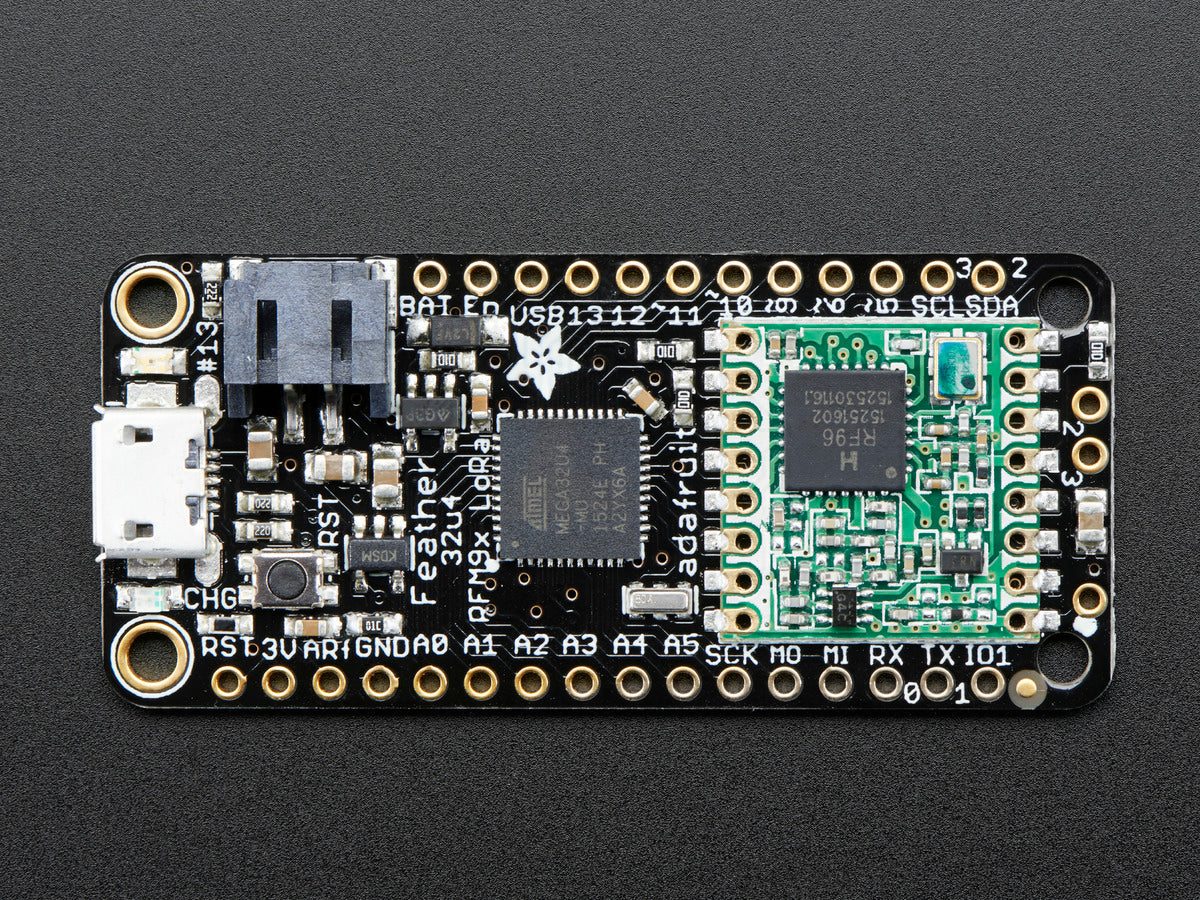Adafruit
Adafruit Feather 32u4 RFM95 LoRa Radio, 868 or 915 MHz, RadioFruit
Adafruit Feather 32u4 RFM95 LoRa Radio, 868 or 915 MHz, RadioFruit
Couldn't load pickup availability
This is the Adafruit Feather 32u4 LoRa Radio (RFM9x). We call these RadioFruits, our take on an microcontroller with a "Long Range (LoRa)" packet radio transceiver with built in USB and battery charging. Its an Adafruit Feather 32u4 with a 868/915 MHz radio module cooked in! Great for making wireless networks that can go further than 2.4GHz 802.15.4 and similar, are more flexible than Bluetooth LE and without the high power requirements of WiFi.
Feather is the new development board from Adafruit, and like its namesake it is thin, light, and lets you fly! We designed Feather to be a new standard for portable microcontroller cores.
This is the 900 MHz radio version, which can be used for either 868MHz or 915MHz transmission/reception - the exact radio frequency is determined when you load the software since it can be tuned around dynamically.
At the Feather 32u4's heart is at ATmega32u4 clocked at 8 MHz and at 3.3V logic, a chip setup we've had tons of experience with. This chip has 32K of flash and 2K of RAM, with built in USB so not only does it have a USB-to-Serial program & debug capability built in with no need for an FTDI-like chip, it can also act like a mouse, keyboard, USB MIDI device, etc.
To make it easy to use for portable projects, we added a connector for any of our 3.7V Lithium polymer batteries and built in battery charging. You don't need a battery, it will run just fine straight from the micro USB connector. But, if you do have a battery, you can take it on the go, then plug in the USB to recharge. The Feather will automatically switch over to USB power when its available. We also tied the battery thru a divider to an analog pin, so you can measure and monitor the battery voltage to detect when you need a recharge.
Here's some handy specs! Like all Feather 32u4's you get:
- Measures 2.0" x 0.9" x 0.28" (51mm x 23mm x 8mm) without headers soldered in
- Light as a (large?) feather - 5.5 grams
- ATmega32u4 @ 8MHz with 3.3V logic/power
- 3.3V regulator with 500mA peak current output
- USB native support, comes with USB bootloader and serial port debugging
- You also get tons of pins - 20 GPIO pins
- Hardware Serial, hardware I2C, hardware SPI support
- 7 x PWM pins
- 10 x analog inputs
- Built in 100mA lipoly charger with charging status indicator LED
- Pin #13 red LED for general purpose blinking
- Power/enable pin
- 4 mounting holes
- Reset button
This Feather 32u4 LoRa Radio uses the extra space left over to add an RFM9x LoRa 868/915 MHz radio module. These radios are not good for transmitting audio or video, but they do work quite well for small data packet transmission when you need more range than 2.4 GHz (BT, BLE, WiFi, ZigBee).
- SX1276 LoRa® based module with SPI interface
- Packet radio with ready-to-go Arduino libraries
- Uses the license-free ISM bands: "European ISM" @ 868MHz or "American ISM" @ 915MHz
- +5 to +20 dBm up to 100 mW Power Output Capability (power output selectable in software)
- ~300uA during full sleep, ~120mA peak during +20dBm transmit, ~40mA during active radio listening.
- Simple wire antenna or spot for uFL connector
Our initial tests with default library settings: over 1.2mi/2Km line-of-sight with wire quarter-wave antennas. (With setting tweaking and directional antennas, 20Km is possible).
Comes fully assembled and tested, with a USB bootloader that lets you quickly use it with the Arduino IDE. We also toss in some headers so you can solder it in and plug into a solderless breadboard. You will need to cut and solder on a small piece of wire (any solid or stranded core is fine) in order to create your antenna. Lipoly battery and USB cable not included but we do have lots of options in the shop if you'd like!
Downloads








